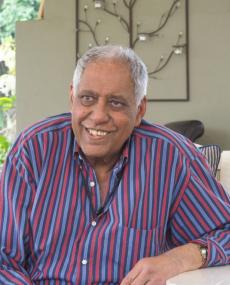
Essop Goolam Pahad was an anti-apartheid activist who was a member of the ANC and was exiled because of what was called an illegal strike and this was after the banning of the ANC. In exile, he attained a few qualifications, and, in his return, he served under Thabo Mbeki. Under the Presidency, he had political duties such as being responsible for the Office of the Rights of the Child (ORC), Office on the status of Disabled People (OSPD), Office on the Status of Women (OSW), The National Youth Commission and the government Communication and Information System (GCIS)
Essop Goolam Pahad was born on the 21st of June 1939 in Schweizer-Reneke in Western Transvaal (now North West Province). He grew up in a family of political activists. His father Goolam Hoosain Ismael Pahad was a leading member of the Transvaal Indian Congress and the South African Indian Congress. He has four brothers, one of whom is Aziz Pahad, who was an anti-apartheid activist, a former minister, and an MP for Johannesburg West Highlands.
He attended the University of Witwatersrand and the University of Sussex. He received his Bachelor of Arts Degree in political science at Wits and he completed his Master of Arts in African politics and a PhD in history. The title of his thesis was “The Development of Indian Political Movements in South Africa - 1924-1946”.
Just like his father Essop joined the Transvaal Indian Youth Congress (TIYC) and this was after the banning of the African National Congress (ANC). He was part of the Transvaal Indian Youth Congress (TIYC) volunteers, and he was responsible for producing and distributing ANC pamphlets and posters in the 1960s. In 1962, Pahad was arrested for organising an illegal strike. In 1964, he was banned for 5 years and went into exile. While in exile, Pahad became more actively involved with the ANC and served as a leadership structure of the ANC and the South African Communist Party (SACP). During this period, he also graduated from the Institute of Social Sciences in Moscow, Russia and completed a short military course in Angola. He served on the regional command of ANC’s Political and Military Council in London, before returning to South Africa in 1990.
After South Africa’s general elections in 1994, Pahad served as the Parliamentary Counsellor to the then Deputy President Thabo Mbeki. In the 1999 general election, Pahad was appointed as the Minister in the Presidency. In 2000, Pahad was accused of being involved in corruption, but he denied the accusations.
Pahad carried out a wide range of political duties such as having responsibility for the Office of the Rights of the Child (ORC), the Office on the Status of Disabled People (OSPD), the Office of the Status of Women (OSW), the National Youth Commission and the Government communication and information system (GCIS). After Thabo Mbeki resigned as the president of South Africa in September 2008, Pahad also submitted his resignation as minister.
Pahad represented the SACP on the editorial Council for the World Marxist Review. He was a member of the organizing committee of the FIFA World Soccer Cup that took place in South Africa. Pahad was the chairman of the board of the Mali Timbuktu Manuscripts Trust as well as a chairman of the board of trustees of the South African Democracy Education Trust and a former member of the national executive committee of the ANC. After leaving the government in 2008, he launched a South African monthly journal named The Thinker which was later taken over by the University of Johannesburg.
Essop Goolam Pahad passed away on 6 July 2023 in Johannesburg, Gauteng.